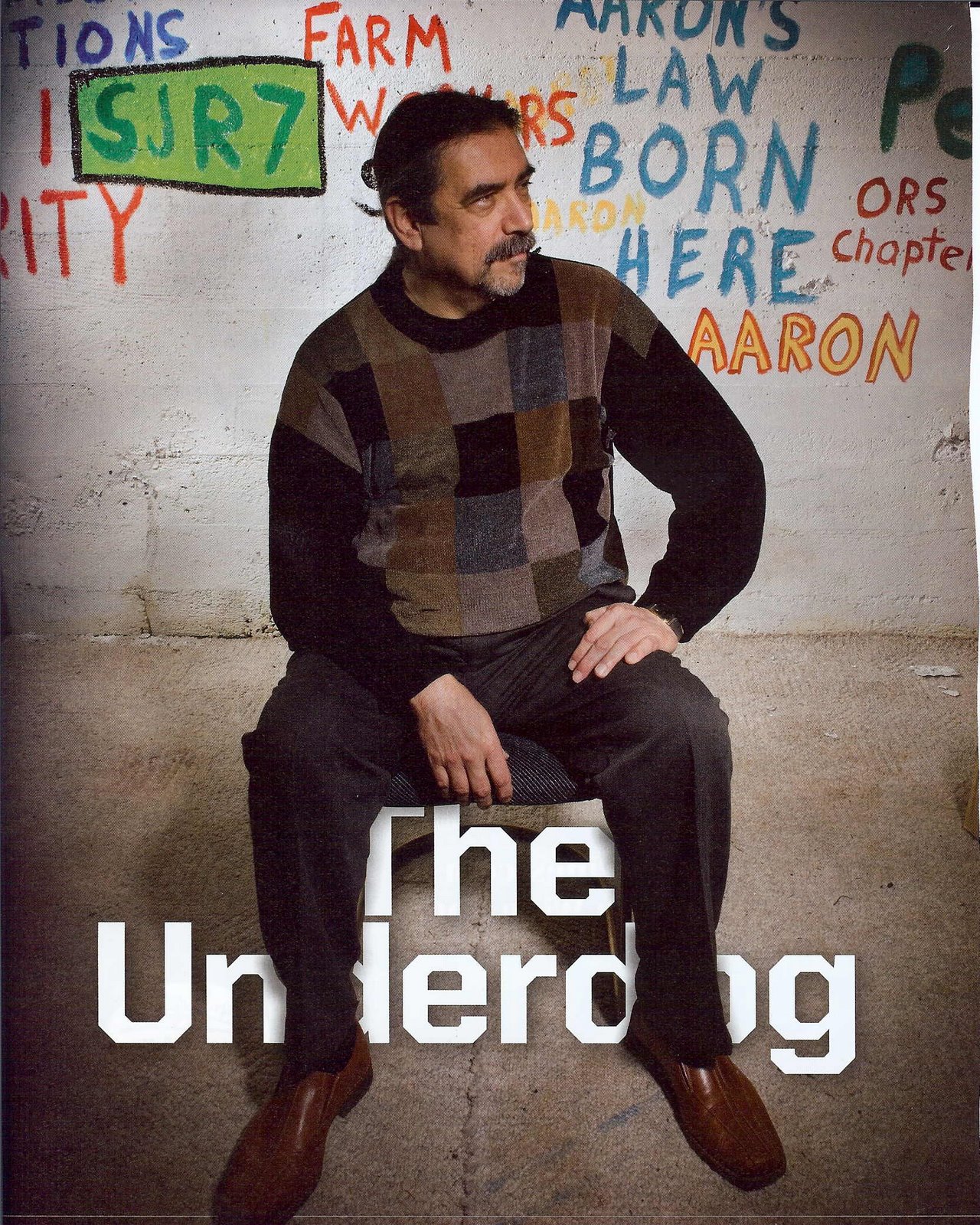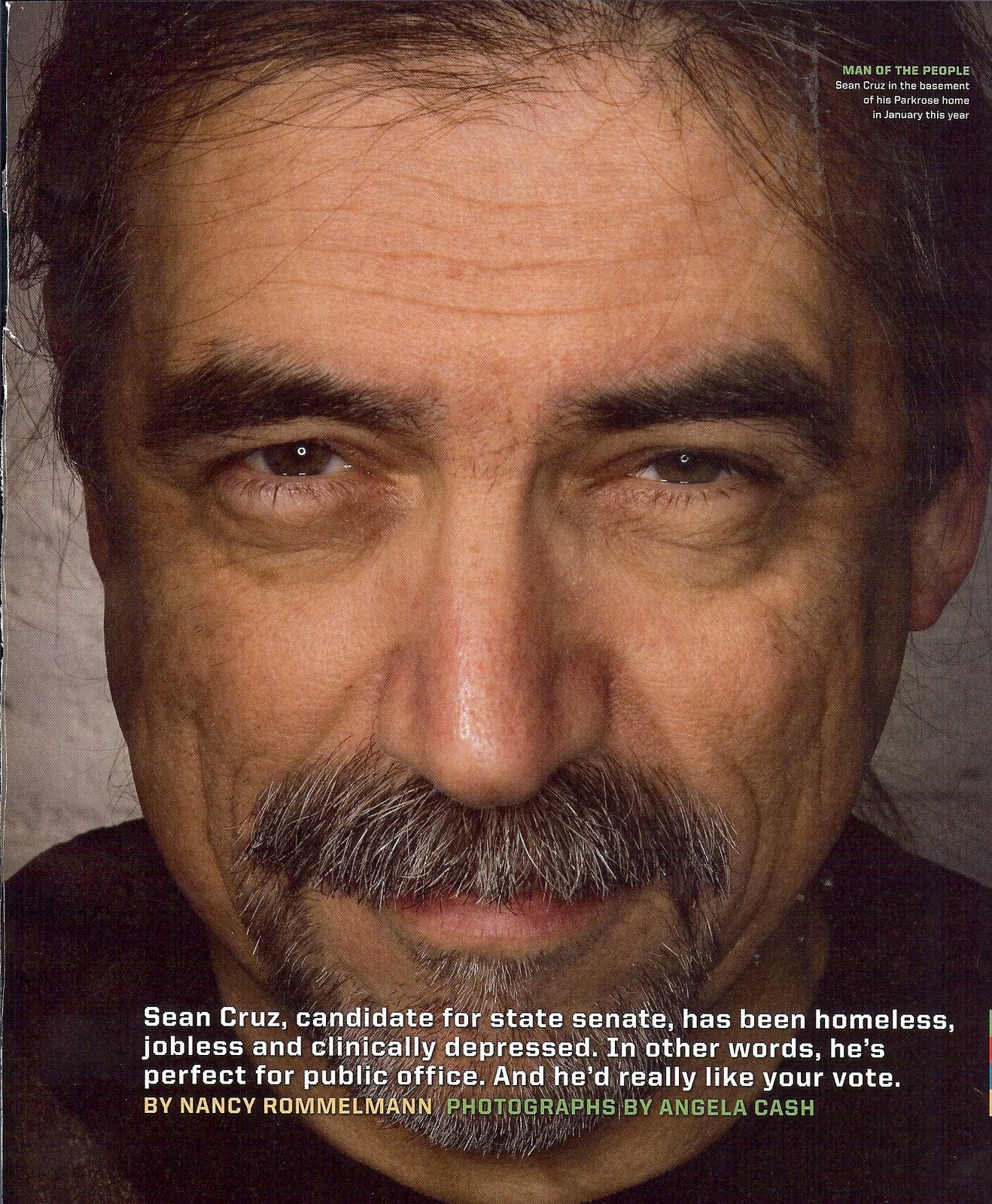Searching for Cesar Chavez in Portland, Oregon, pt 2
By Sean Cruz
I was invited to speak before the Portland City Council last night, who were conducting their own search for Cesar Chavez….
I want to thank Mayor Adams and the Council for providing the opportunity, very sincerely.
I provided written testimony to the Council, but decided to speak without referring to notes.
Unfortunately, I ran out of speaking time before the call to action part….
The sad fact of the evening was that the discussion was so frozen into the question of renaming a street, that no one would have heard the call, not even in the People’s Republic of Multnomah.
Supporters of renaming a street dream of cruising up and down 39th Avenue….
It will make them feel good about themselves, feel like they are actually doing something to benefit farmworkers they will never meet and causes they will never join….
…cruise to the North, cruise to the South…
…convenient shopping either way…
--------------
Searching for Cesar, pt 3 “Reflections on the City Council hearing” coming soon
The search continues….
Testimony for Portland City Council
June 23, 2009
My name is Sean Cruz; I am a resident of NE Portland.
Like Cesar Chavez, I am the son and grandson of Mexican farm workers; like Cesar Chavez, I am a Mexican American, a US citizen with Mexican roots; like Cesar Chavez, I am a Chicano. I found my own Chicano identity through Cesar Chavez, through the National Chicano Movement in California in the 1960’s.
Throughout this long Portland argument, Cesar Chavez has been variously described as a "Latino", as a "Hispanic", as a "not Hispanic, but an American", as an "American" and as a "Latino American", but never as a Mexican American or a Chicano.
None of these terms are synonyms, yet in Portland they are used interchangeably to describe very different—even profoundly different—cultures. Where is the honor in that?
In 1954, in Brown vs Board of Education, the school desegregation case, African Americans gained protection under the 14th Amendment.
Mexican Americans did not gain the same protection until 1970, in Cisneros vs Corpus Christi School District, where Mexican Americans were finally recognized in US courts as a unique, distinct ethnicity, as a People.
Is it any wonder that our children, our families suffer the highest high school dropout rates?
Portland, overwhelmingly white, is just about 40 years behind.... Mexicans, Mexican Americans have not yet gained recognition here in Portland as a People.
For all of the talk in respect to diversity, throughout the many pages of the documents before you in items 860-1 and 860-2 there is but a single reference to Cesar Chavez’ race, culture and ethnicity, and that is the word “Latino.” Where is the honor in that?
I recognize that two years ago, Mayor Potter and the Council very sincerely wanted to express respect for the life and achievements of Cesar Chavez in a significant, permanent public way, but frankly the Council was in receipt of some very bad advice, which brings us to where we are this evening.
With all due respect, where is the honor in accepting these document from five well-meaning-but-poorly-informed white people who cannot tell us apart?
I hope that you, Mayor Adams and members of the Council, will use this time to obtain a far better understanding of precisely who you are talking about when the subject is “Cesar Chavez” or “farmworkers” or “Cesar Chavez’ people” and why it is far too early to celebrate, not while farmworkers across the entire USA continue to suffer unjust and even inhumane living and working conditions.
This street-renaming obsession, focused entirely within the City of Portland, where there is little actual farm work, has cost farmworker advocates working to remove the injustices written into Oregon state law the entire past two years.
Had this street-renaming effort been focused on making a difference in real lives, we might have accomplished something real and we might have had something real to celebrate tonight….
The only wage earners in Oregon who have no right to overtime pay for working beyond 40 hours a week are our farmworkers, our mostly-Mexican farmworkers.
Oregon’s mostly-Mexican farmworkers won the right to meal and rest breaks during the workday only five years ago, the only population in the state denied that fundamental right.
Farm labor in the USA is not a “Latino” experience, or a “Hispanic” experience and not necessarily an “immigrant” experience.
Historically and to the present day, farm labor is by a wide margin a Mexican experience, a Mexican-American experience, and in California, where Cesar Chavez family and my family worked the fields, a Chicano experience, and it is 100% an experience of deep, abject poverty and injustice, conditions that continue to exist today.
“Hispanic” and “Latino” refer to cultures that originated in Europe and mixed here one way or another, beginning in the 16th century.
Before there was an Oregon, before there was a USA, before there was a Mexico, before there were continents named after a Portuguese sailor, our ancestors were here and we were a People. We were many Peoples.
Chicanos, like Cesar Chavez, identify with our aboriginal roots rather than the European. Our ancestors did not cross the Atlantic ocean to come to America.
All Chicanos are Mexican Americans, but not all Mexican Americans are Chicanos. You cannot tell us apart by looking at us.
These facts explain in part why the Portland Hispanic Metropolitan Chamber of Commerce has been completely silent on the street-renaming issue over the entire past two years. There are no Chicanos over there, and no farmworkers either.
The problems
The first problem, going back to the beginning of this mess, was the failure to recognize that there is no monolithic Hispanic or Latino community.
Racially and ethnically, culturally and by nationality, we are the most diverse people on earth, and we are each equally proud of who we are.
The second major problem is that this discussion ended as soon as it began, focused from the start on street-renaming as the only permissible way to honor Hispanic Latino American Cesar Chavez in the City of Portland, with every other idea frozen out.
The third problem was the failure to educate the public as to the life and achievements of Cesar Chavez, and as to the living and working conditions of farmworkers both then and now, which is related to the fourth problem.
The fourth problem (and I’m not referring to the specifics of the City’s legion of process problems) was the fact that the City’s process opened the door to the anti-Mexican and anti-immigrant insults and bigotry, and then stood aside and let the inflammatory rhetoric flow.
The City’s own Office of Human Relations and Human Rights Commission simply vanished. Their work appears to be built around collecting their paychecks.
The fifth problem is that if the same amount of energy had been expended on educating the public to the living and working conditions of Cesar Chavez’s people in the present day we might have had an opportunity to make meaningful change in the 2009 legislative session.
The Oregon legislature is about to end its 2009 session without addressing the issue, which means that Oregon farmworkers cannot possibly win the right to overtime pay for overtime work until the 2011 session.
That is a lot of hours of unpaid overtime, but here’s a nice stretch of asphalt, and a whole big pile of animosity to help you forget your troubles….
The sixth problem (and this is not near the end of the long list of problems) now facing Oregon farmworker advocates is how to develop forward momentum in the face of an almost totally white legislature that lacks any champions for farmworkers.
It was Cesar’s Mexican face that got him arrested for refusing to sit in the balcony, in the Mexican section of a movie theater, this U.S. Navy veteran.
In a town and in an era where signs saying “No Mexicans allowed” were commonplace, where the US farm labor force was mostly made up of Mexican men, women and children, whole families, grandparents, even pregnant women, enduring grinding poverty and hard labor, Cesar Chavez, Mexican American Chicano Cesar Chavez, short hoe in hand, began to organize the farmworkers, in fields like these….
Cesar Chavez’s struggle and his campaigns were defined by his life experience as a brown-skinned, Spanish-speaking, Mexican-American migrant farmworker, a person who far too many Americans would categorize even today as a wetback, and they do….
We’ve all seen and heard the bigoted comments that this street-renaming fiasco has generated.
The only persons that those insults are directed towards are Mexican people, Mexican-American people, like Cesar Chavez, like me. Papers or no papers, people can be very specific about who they do not like.
One would think that the City would have charged its own Office of Human Relations or its Human Rights Commission to mediate the conflict, to follow its own mission statement, to work to reduce the expression of bigotry and anti-Mexican discrimination that the City’s own highly-dysfunctional and mostly ad hoc street-renaming process set in motion, but that did not happen.
The reason that did not happen is because the Director of the Office of Human Relations has been in the bag for renaming a street from the very beginning.
Our Mexican American experience is unique to us, and Cesar Chavez brought that experience out of the shadows, brought us out of the shadows, Mexican people, Mexican Americans, Chicanos.
There is no honor in being told “you people all look alike.”
Oregon’s mostly-Mexican farmworkers remain in the shadows.
Oregon’s mostly-Mexican farmworkers remain the state’s only population that is prohibited by law from the right to overtime pay for working more than 40 hours a week.
As we meet today, the New York State Senate is preparing to vote on a bill that would remove from state statute the race-based exclusionary laws that deny farmworkers the right to a day off from work, that deny farmworkers and no other workers the right to overtime pay for working more than 40 hours a week.
The state of New York is home to a large duck liver pate industry, where farm workers are required to work 12 hours a day, seven days a week, force-feeding ducks.
Worse, a characteristic of the duck liver industry is that each worker is assigned the same several hundred ducks to force-feed three times a day each for 22 consecutive days. They cannot have another worker substitute so someone can get a day off “because it upsets the ducks.”
The Call to Action
I ask you today to choose to make more than a symbolic gesture, to make instead a real difference in the lives of farmworkers, sending a message of support to the farm workers of New York state.
I ask the Portland City Council to honor the courage of Cesar Chavez by calling for a City-wide boycott of duck liver products until the laws excluding farmworkers from the rights and protections that all other workers enjoy are removed from statute.
I ask the Portland City Council to honor the sacrifice of Cesar Chavez by calling on the Oregon Legislature to remove the provisions in Oregon statute that exclude farmworkers from the right to overtime pay for overtime work.
Thank you.
Sean Cruz
June 23, 2009
Testimony for Portland City Council
Subscribe to:
Post Comments (Atom)






4 comments:
I cannot stand behind your views and comments regarding renaming a street in honor of Cesar E. Chavez. I understand a lot of your posts but I disagree with the white bashing that is so prevalent within the Pro-Renaming Committee. I was present during the first round at Ockley Green and cannot help but be appalled how the committee acted. I don't where the white bashing is coming from or the heavy-handed tactics but if you want respect, real honorable respect, then you simply cannot bulldoze people and make racist statements like in your blog (sixth reason). If your community can get together in a respectful manner (not as hostile takeover by playing the race card) then that is something I can get behind as a white male. If not, then your committee will have a heck of a time bridging any communities together. After all, isn't that what we all want?
Anonoymous:
Thanks for commenting. I'm not sure I understand your impressions, so I'm posting to clarify.
I was also at Ockley Green, and I agree with you that the Boulevard Committee's behavior was apalling.
I was opposed to renaming Interstate, but I went to the meeting to see for myself how the community and the Committee would interact.
Ms Guembes was openly hostile, disrespectful and accusatory from the start.
You make the comment "...your committee...."
I am not a member of the Boulevard Committee, and have never been invited to any of its meetings, which are apparently never open to the public.
I know a number of the members (including the secret, inside City Hall members)of the Boulevard Committee, and am aware of the insider promises that were made two years ago that a street was going to be renamed at the end of this process.
I am opposed to this sort of "process."
You also make the comment: "If your community...."
The community that I am a part of never recommended that a street be renamed. We were frozen out of the entire discussion from the beginning.
I hope this clarifies my comments.
Feel free to comment back; let's do what we can to bridge communities together.
Fair enough. I guess I should've read your blog a little more carefully. However, I have an issue with your association with using the term "an almost entire white legislature" in problem number 6 of your post. Please understand that white people feel very cautious about embracing cultures that will play the race card. I'm, of course, not speaking for every white person out there, but I'm sure I'm not alone in my community when I feel very threatened by a group of people who use the race card and heavy-handed tactics to gain a political foothold. It doesn't honor Cesar E. Chavez and I'm happy to learn you are not a part of Guembes' committee. I stand corrected and hope for a better Portland for all of our legal citizens. But please, no white bashing or comments. People actually argue that I'm racist for my views on this topic. I only wish to educate people with facts and not useless rhetoric. I will be more careful in the future reading posts.
I wish your community the best.
I hope, Anonymous, you have a reason for being anonymous other than to hide your opinions behind the mask of anonymity.
Second, what does it mean to "play the race card"?
White people play that card every day without (mostly) realizing it.
We have privileges we are mostly unaware of. Whatever we say is the standard, the norm. What Sean says, to most of us, is not the norm. And that's because he's not white.
Where does white bashing come from? From four hundred years of genocide and conquest, perhaps.
Did you know, Anonymous, that the United States stole about half of what was Mexico?
Is white bashing excusable? No. But it is nothing compared to what whites have imposed on people of color in this country, a country which was built on genocide and slavery.
That can get a person's dander up.
Exactly how is noting that the legislature is almost entirely white racist? What constitutes a "respectful manner" if that true statement is somehow white bashing racism?
Would "sí, señor" be a "respectful manner"?
When one person of color makes a rude or hostile statement, so many white people (and you, Anonymous, are among them) lump all the other people of that group together to hold them responsible, as you did with Sean. If you went to Ockley Green, why do you not know that Sean was not on the Boulevard Committee?
Why was Obama responsible for statements made by other blacks? That is racism.
Why didn't you focus on this, for instance: "The fifth problem is that if the same amount of energy had been expended on educating the public to the living and working conditions of Cesar Chavez’s people in the present day we might have had an opportunity to make meaningful change in the 2009 legislative session."
Sean is diplomatic because, I assume, he would like you to go along with his statement—I don't have that burden and I am appalled.
I suggest you read Tim Wise's book, "White Like Me: Reflections on Race from a Privileged Son."
It will open your eyes. Wise is also not as rude and in your face as I am.
Post a Comment